
"Although the house was a mess," says architect John Eifler, "the layout and many key elements were intact. The enormous window and several eyebrow windows remained. Much of the wood needed replacement, but original glass survived. We found boxes of tiles ...."
WHEN, IN 1927, William Day Gates built his retirement home, in Crystal Lake, about 50 miles northwest of Chicago, he aptly named it "Trails End." Gates, the founder and president of the American Terra Cotta & Ceramic Co., apparently used whatever materials were lying around at the factory. He lavishly applied tiles inside and out and even used packing materials in the structure of the house itself (see p. 57).
Gates' Illinois company made architectural terra cotta for more than 8,000 buildings in the United States and Canada, among them the so-called "jewel-box" banks designed by Louis Sullivan, Chicago's Carson Pirie Scott & Co. department store, buildings by Wright and by Purcell & Elmslie, and the Wrigley Building. His company also made Teco pottery.
It was therefore fitting that, after Trails End had stood uninhabited and neglected, the house was discovered, in 2008, by a passionate collector of Arts & Crafts furniture and pottery-especially Teco pottery.
"I first worked with Tim Pearson when he hired me to restore the 1911 Frank Lloyd Wright Balch House, in Oak Park," says Chicago-based architect John Eifler.
"Tim, the CFO of a big construction firm, had a huge Teco collection. He was one of the few people who saw this house's value. It was in very rough shape by the time he found it."
"It was being sold as a tear-down," says Julie Pearson. "Tim couldn't get a mortgage because the house had no heat, no electricity; it was uninhabitable."
Diese Geschichte stammt aus der May - June 2023-Ausgabe von Old House Journal.
Starten Sie Ihre 7-tägige kostenlose Testversion von Magzter GOLD, um auf Tausende kuratierte Premium-Storys sowie über 8.000 Zeitschriften und Zeitungen zuzugreifen.
Bereits Abonnent ? Anmelden
Diese Geschichte stammt aus der May - June 2023-Ausgabe von Old House Journal.
Starten Sie Ihre 7-tägige kostenlose Testversion von Magzter GOLD, um auf Tausende kuratierte Premium-Storys sowie über 8.000 Zeitschriften und Zeitungen zuzugreifen.
Bereits Abonnent? Anmelden

Navigating the Lumberyard - Here's some lumber lingo you should know before you venture into a lumberyard.
Here's some lumber lingo you should know before you venture into a lumberyard. Almost everyone fixing an old house will end up at a lumberyard-whether it's a local supplier or the organized aisles of a big-box home-improvement store.

a farmhouse renewed
Sensitive renovations and restoration work preserved a house that dates to 1799.
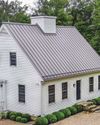
AN OVERVIEW OF METAL ROOFING
METAL ROOFS ARE RESURGENT, FOR GOOD REASONS.
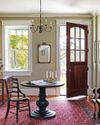
ENDURING BEAUTY IN WALLS of STONE
Now back in the family who had been here since 1830, the old farmhouse is again ready for generations to come. Additions dating to 1840 and the 1950s were preserved.

ARCHITECTURAL DETAILS COME TO LIFE
Owners and their designer celebrate the unique features of a 1912 Arts & Crafts Tudor.
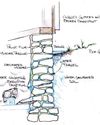
For a Wet Basement Wall
If there's problem common to old houses, it's a wet basement. I'm not talking about occasional flooding, but rather a basement that apparently seeps or leaks after even a rain shower or during snowmelt. Several approaches are available; sustainable solutions will get to the root of the problem.
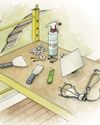
Patching a Plaster Wall
Fix a hole in the wall with a few common tools and some drywall supplies. Practice your technique!
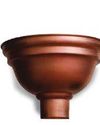
Roofing & Siding
Make note of these historical and unusual materials for the building envelope.

The Riddle of the water
When water incursion happens, the roof isn't necessarily the culprit. Maybe snaking a drain line, or clearing debris from a clogged gutter, temporarily will stem a leak. But a recurring problem usually means other forces are at work. It takes persistence-and a team with the right skills and patience—to identify the source and apply a solution.

Light-filled Craftsman Redo
For a dark kitchen in a 1914 Illinois house, the trick was anchoring white expanses with woodsy warmth.